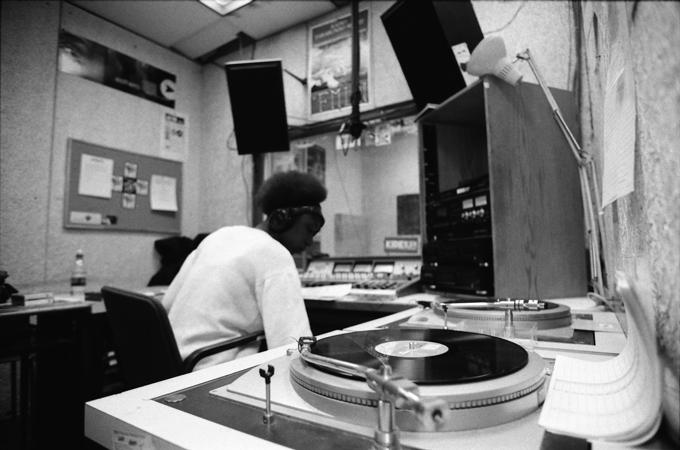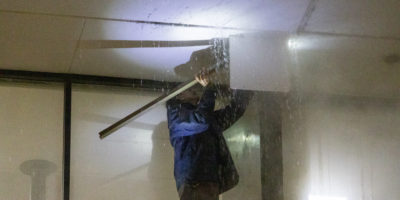By Lori Fazari
A rift has been exposed between RyeSAC and CKLN.
After the radio station’s many false starts at getting a referendum question to RyeSAC’s board of directors, the board recently rejected CKLN’s proposal to ask students for more money.
“Students are kicking in a great chunk [of money] to this radio station and now they’re being asked to kick in more,” said RyeSAC’s president David Steele. “The obvious question is going to be: ‘what’s in it for them.’”
After the board voted in an in-camera session, a private discussion amongst board members only, to reject CKLN’s referendum proposal, RyeSAC struck a committee to address the board’s concerns about the radio station.
Sitting on the committee, which is expected to report to RyeSAC’s Feb. 16 board meeting, are Steele, RyeSAC’s general manager John Fabrizio, v.p. development and finance Vladimir Vasilko, student groups director Maia Garriques and health and safety commissioner Jude Shawera.
Had it passed RyeSAC’s board, Ryerson’s board of governors would have voted on CKLN’s referendum to increase each student’s contribution to $14.03 from $8.03.
The money would have increased CKLN’s student funding to $165,259 starting in the year 2000, when the fee increase would kick in, from the current $94,500 collected. CKLN has lost $88,000 in government funding since 1990.
Station manager Conrad Collaco, who is overseeing the station during a time of debt equaling $129,845 its last fiscal year, said board members weren’t well-informed.
“Before making a decision as important as this they might want to consult with students who actively participate in the station, and beyond that, the students who listen to the station,” Collaco said.
But both sides agree the final decision on CKLN’s funding increase rests with Ryerson students.
“Students should not be allowed to make the decision on whether or not they can afford an increase,” Collaco said.
But Steele said it’s RyeSAC’s responsibility as student representatives to ensure the proposal that reaches the Ryerson population is viable.
“[RyeSAC’s] board had so many concerns they couldn’t bring it to the board of governors in clear conscience,” Steele said. But, he said, “Ultimately it’s up to students to decide.”
Fabrizio echoes this sentiment: “Ultimately the people who should be deciding are the students who fund them.”
The station, which broadcasts at 88.1 FM, still has until next fall to get a referendum passed that would increase their student fees in 2000. “It just gives them a window of opportunity to ensure that students’ concerns are addressed,” Steele said.
The priority of RyeSAC’s ad hoc committee is to recommend how these concerns can be resolved.
The University of Toronto’s campus radio station, CIUT, is undergoing its own financial and management crisis. U of T’s Students’ Administrative Council (SAC) is awaiting a report on CUIT’s structure and the level of student involvement with the station.
Before last week’s RyeSAC board meeting went in camera, board members questioned Collaco on how CKLN serves Ryerson students and about the unaudited financial statements included in its proposal. RyeSAC’s board wanted a copy of CKLN’s audited financial statements, but the station’s auditors were reluctant to provide services after a history of late bill payments.
At its first meeting Monday, the committee said CKLN must address financial accountability and their accountability to students.
Fabrizio said CKLN needs to have “a greater focus on Ryerson,” which he said would come focus on Ryerson,” which he said would come from “letting people know that Ryerson is where they’re located, Ryerson is who funds them, not entirely but a fair chunk, and from doing more for the community.”
Collaco said the station, which has two full-time employees, five part-time employees and about 150 volunteers, has done outreach to students, including running free advertisements for Ryerson’s Anime club, the food bank and the West Indian Students’ Association of Ryerson (WISAR).
But Collaco said the station has limited resources to reach out to Ryerson, and its location in the basement of Jorgenson Hall doesn’t allow for exposure.
“We are Ryerson’s community station,” Collaco said. “I don’t think enough people in general know that. I think we definitely have to get the message out to more students.” He said the problem is organizing a limited staff to accomplish that.
CKLN is waiting to hear about a government grant that would give the station funds to hire a part-time advertising and fundraising co-ordinator. If the student levy increase falls through, Collaco said this person would consistently raise money.
“We’ll do whatever we can to stay alive as a radio station,” Collaco said.
“We’ve laid out a plan for how we’re going to manage with or without the money” from a student fee increase, he said. “If we don’t get the money it’s going to be much more difficult.”












Leave a Reply